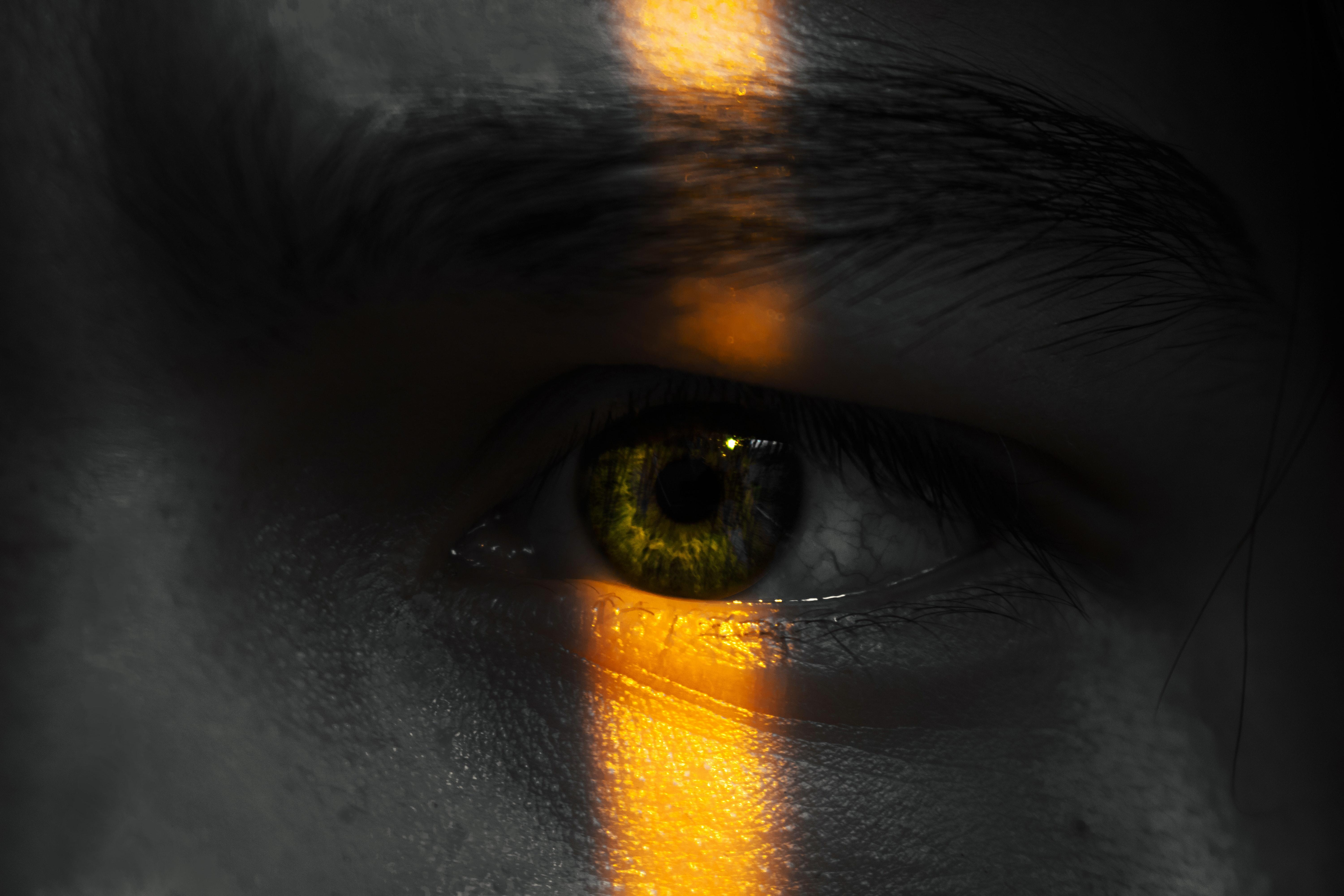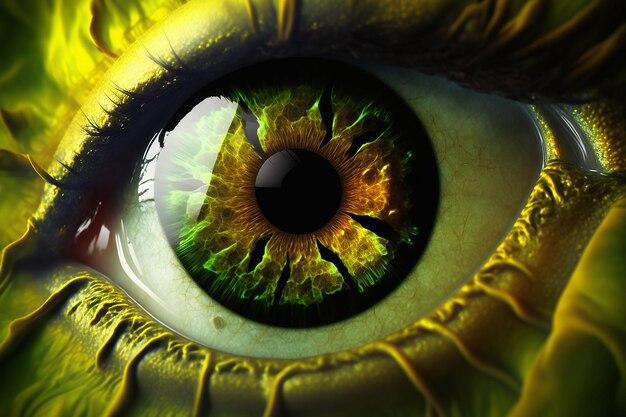As we cuddle up under our blankets at night, the darkness can sometimes feel a bit eerie. Our imagination runs wild, and the thought of glowing eyes lurking in the shadows may cross our minds. While it’s true that certain animals, like cats and dogs, possess the ability to reflect light and make their eyes glow in the dark, humans, unfortunately, do not share this peculiar feature. Have you ever wondered why?
In this blog post, we will uncover the fascinating reasons behind why human eyes do not glow in the dark. We’ll explore the science behind eye color in different species, take a closer look at why animals’ eyes glow, and delve into the specific characteristics that prevent human eyes from emitting that eerie glow, even in the darkest of nights. So, grab a cup of hot cocoa, get cozy, and join us on this enlightening journey through the hidden world of ocular wonders!
Let’s start by understanding why animal eyes have a tendency to shine in the dark while ours remain mysterious and unilluminated.

Why Don’t Human Eyes Glow in the Dark?
Have you ever wondered why your cat’s eyes seem to glow in the dark, while our own eyes don’t have the same eerie effect? Here’s the scoop on why human eyes don’t possess this supernatural ability.
The Science Behind It
You may be familiar with a phenomenon called eyeshine, which gives certain animals their glowing eyes in the dark. This mesmerizing glow is actually caused by a structure in the eye called the tapetum lucidum, a reflective layer that enhances vision in low-light conditions.
The Missing Tapetum Lucidum
While animals like cats, dogs, and raccoons have a tapetum lucidum, our human eyes lack this luminescent layer. So, instead of glowing, our eyes appear dark and mysterious in the darkness of night.
Evolutionary Changes
You might be wondering why humans missed out on this handy adaptation. Well, it all comes down to our evolutionary path. We humans are diurnal creatures, meaning we are naturally active during the daytime. Unlike nocturnal animals, we have evolved to rely on other senses and technologies to navigate the dark.
Our Remarkable Retinas
Though our eyes don’t have the tapetum lucidum, our retinas are still highly adept at capturing and processing light. Thanks to the cooperation between our retinas and the brain, we can see reasonably well in low-light conditions without the need for a glowing spectacle.
Embracing the Darkness
While it would be undeniably cool to have eyes that glow in the dark, maybe it’s just another way nature has kept us humble. After all, wandering around with glowing eyes might make it a little difficult to blend in during a game of hide-and-seek.
The Surprising Advantage
On the bright side (pun intended), our lack of glowing eyes can actually work to our advantage. Imagine how challenging it would be to fall asleep with a constant glow emanating from your eyes. It would be like having a Hollywood spotlight following you everywhere you go! Thankfully, we can peacefully drift off to dreamland in complete darkness.
So, the next time you find yourself in the dark, marvel at the glowing eyes of the animals around you. While our human eyes may not share this otherworldly trait, we can still appreciate the beauty and wonder of the natural world, even without a touch of luminescence.
References
- Source 1
- Source 2

FAQ: Why don’t human eyes glow in the dark?
Have you ever wondered why animals’ eyes seem to have a mysterious glow in the dark, while humans don’t share this fascinating feature? Well, today, we’re diving into this intriguing question to shed some light on the matter.
What colors do purebred Huskies’ eyes have
Let’s start off with a dazzling question unrelated to the topic but still worth knowing. Purebred Huskies are known for their mesmerizing eyes, which can come in various shades. These adorable dogs can have eyes that are either brown, blue, or even bi-colored! Talk about having unique peepers, right?
Why do animals’ eyes glow, but not humans
Ah, the age-old mystery of glowing animal eyes! It’s like witnessing a spooky episode of “X-Files” right in your backyard. Unlike us boring humans, certain animals possess a special layer behind their retinas, known as the tapetum lucidum. This layer is responsible for reflecting light back through the retina, giving their eyes that otherworldly glow.
But why do animals have this extra layer in the first place? One theory suggests that it helps them see better in the dark. You see, when light enters the eyes of these creatures, the tapetum lucidum bounces it back, giving their photoreceptor cells a second chance to detect it. It’s almost like they have their very own built-in flashlight! Talk about being prepared for impromptu midnight adventures.
Why do Huskies’ eyes turn white
Have you ever stumbled upon a Husky with haunting white eyes that look like they belong in a ghost story? Don’t worry; it’s not a sign of their secret membership in the supernatural realm. When Huskies experience strong emotions like excitement or fear, their eyes can temporarily lighten or even turn completely white. It’s like they’re trying to channel their inner ghosts, but without the ectoplasmic goo.
This phenomenon, known as the “Siberian Husky ghost eye,” occurs due to a lack of pigment in their irises. When light hits their eyes from the right angle, it scatters and reflects, causing this spooky hue. But don’t worry, their eyes will return to their original color once the drama is over.
Why don’t human eyes glow in the dark
Now, let’s address the star of the show: human eyes and their disappointing lack of luminescence. You see, humans may not have a tapetum lucidum layer like our nocturnal animal friends, but we have something equally fascinating: a high concentration of cone cells in our retinas.
Cone cells are the unsung heroes responsible for our daytime vision and the ability to see colors. They dominate our retinas, while the rod cells, which are more sensitive to low light, take a backseat. This cone cell party in our eyes makes us lose out on the superpower of glowing in the dark. But hey, at least we can appreciate all the vibrant colors of the world around us in broad daylight!
So there you have it, a captivating explanation for why human eyes don’t possess that enchanting glow. Despite not being able to give off a supernatural radiance, we still have plenty of other marvelous traits that make us truly unique.
Now, if you’ll excuse us, we’re off to ponder other fascinating conundrums, like why unicorns only exist in myth or why socks seem to disappear in the dryer. It’s a never-ending adventure into the wonders of the world around us!
